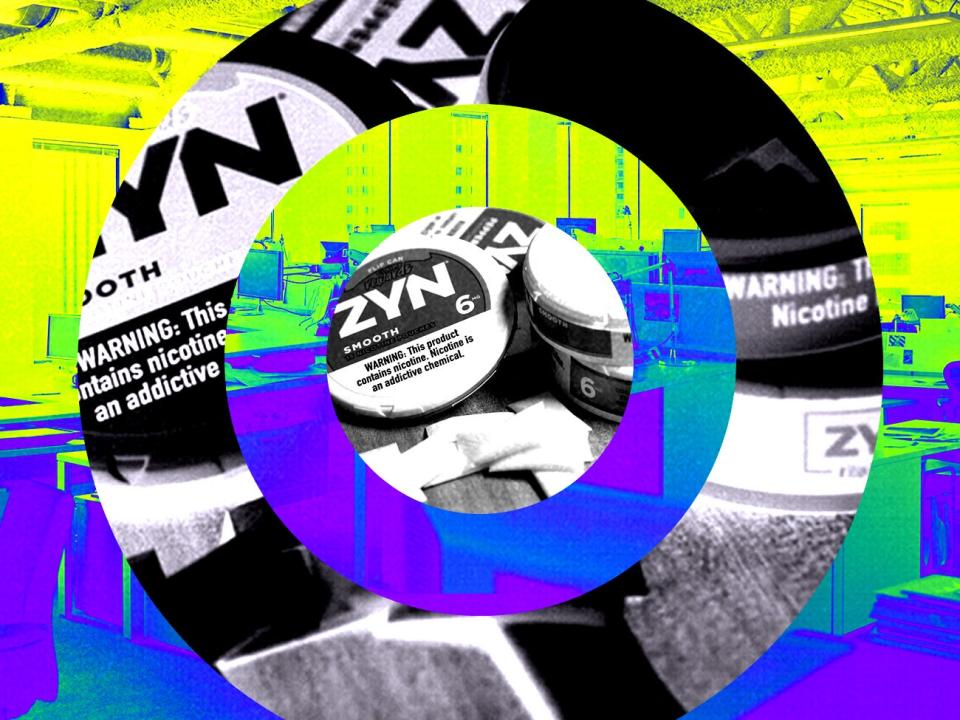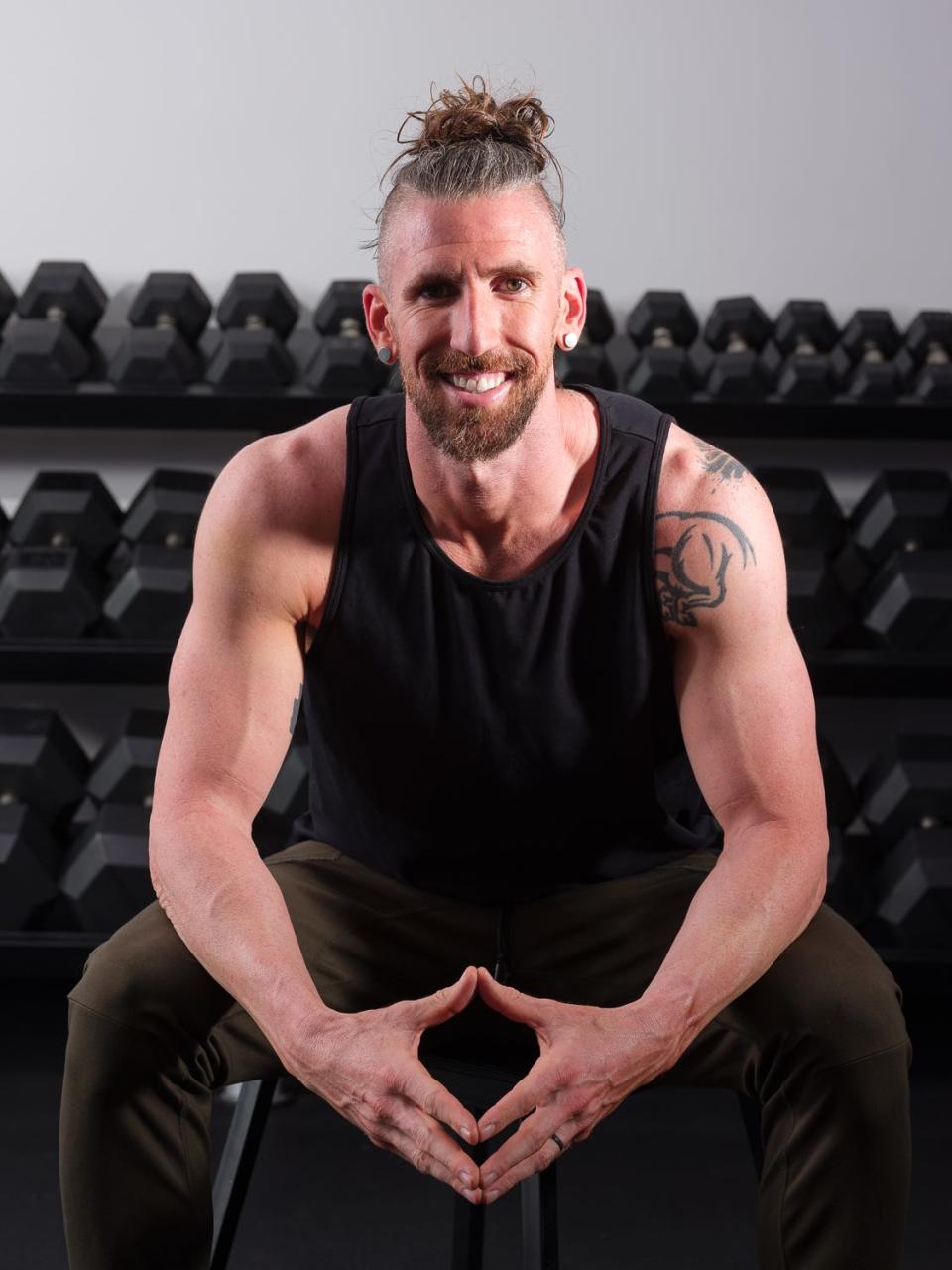The new office ritual? Zyn nicotine pouches

Nicotine pouches are finding an audience with people who view them as a healthier alternative to other products.
Five men with prior nicotine or tobacco use habits told BI they use Zyn to help them focus.
"If I need to work on something that's a little bit more important than other things — like it's just a part of the routine," one said.
At a prior job, Clay Coomer would sometimes see a colleague in the hallway and have a quick exchange.
"He would be like, 'Hey, you need one?'" Coomer told Business Insider.
The item in question was a Zyn, a brand of nicotine pouch that users often place under their lips to get a boost. Coomer and his former coworker would each share their stash when the other's was running low.
For Coomer, who's 36 and works in marketing, popping in a Zyn is just sometimes how he gets hard work done.
"If I need to have a challenging conversation with somebody or if I need to work on something that's a little bit more important than other things — like it's just a part of the routine," he said.
Coomer isn't alone. BI spoke with a handful of men in various fields who are relying on the lift they get from the nicotine as a way to get through the day — especially the hardest things that can be difficult to tackle — without the mess and health risks of chewing tobacco or cigarettes.

All had used nicotine or tobacco products previously and described turning to Zyn because they viewed it as a healthier or cleaner alternative to the likes of dip, vaping, or cigarettes.
The rise of Zyn
Zyn has been available for sale in the US since 2014 but has seen wider popularity recently.
Shipments of the nicotine pouches in the US in 2023 were up 62% year-over-year. And while product shipments can outpace consumer sales, Tobacco giant Philip Morris International, which owns Zyn's manufacturer, Swedish Match, forecasts even greater shipping volume this year. Zyn pouches have found favor with everyone from high-powered Wall Street traders to Tucker Carlson and GOP lawmakers.
There are even "Zynfluencers," who post videos on social media of themselves slipping pouches under their lips.
One 28-year-old corporate performance management consultant who previously used dip says he views Zyn as "the lesser of all the evils" among nicotine and tobacco products in terms of health risks.
Some sources asked not to be named because they didn't want to jeopardize future job prospects, but their identities are known to BI.
Raymond Niaura, chair of the Department of Epidemiology at New York University and an expert on tobacco dependence, told BI that there is risk of addiction with any product containing nicotine. (The FDA has issued a similar warning.) Niaura added that pouches tend to deliver less nicotine than cigarettes, which he said are more addictive. Instead, the pouches are more akin to nicotine replacement therapy.
Niaura said, in general, a nicotine pouch is a "pretty clean product" yet still could carry risks: Nicotine, for example, can increase heart rate and blood pressure, so someone at risk for cardiovascular disease might want to be particularly careful using it.
"It's early days. It's hard to say for sure where these products fit in," he said, referring to how addictive products like Zyn might be.
The 'hand of God'
As for using a pouch at work, nicotine pouches tend to be so small they're nearly invisible to others, which is another part of the appeal for some users. Not that it's such a big deal anyway, several users told BI, because the pouches don't contain tobacco. So there's not the same stigma there might be with tobacco products.
"Nobody really cares," Coomer said, referring to using Zyn at startups. When he worked for a big blue chip company, he was somewhat more guarded about pulling out his canister of Zyn or keeping it in his pocket so it didn't look like a container of dip.
Nate Palmer is a personal trainer, podcaster, and founder of Million Dollar Body Labs. He works remotely with clients to improve their fitness and overall health. He chewed nicotine gum about a decade ago as a pick-me-up. But after not using nicotine for a while, he wasn't prepared for the hit he got when he popped a 6 mg pouch of Zyn. "I felt like the hand of God on my central nervous system. I was just feeling amazing. And then I just had to go throw up." Palmer has since downshifted to the 3 mg pouches.
Now, he holds himself to four pouches a day. And while he said he's not quite addicted, he does miss it when he hasn't done it for a while, he said. For now, it's become part of his routine when he has to concentrate on something demanding.

"I basically will just do it now for, like, podcasts or if I've got like a sales call or something where I'm like, I need to get dialed in," he said. "I've been doing it like at kid's birthday parties where I'm like, 'I don't want to talk to these people. I need to be more friendly.'"
Palmer sees using Zyn as an important part of his ritual around essential work. He advises his clients to focus on creating rituals to pair something difficult with something that can act as a reward, a concept called temptation coupling. In his case, his ritual helps him get through major tasks at work. "When I sit down when I try to do deep work, like I kind of have a ritual now where I put on some binaural beats from Spotify, I'll put a Zyn in and then, you know, I'll make sure that I have my list of stuff I need to do," he said.
Getting over the hump
Chandler, a 24-year-old software engineer who started smoking cigarettes in his teens before switching to vaping and now Zyns, said the pouches give him a similar "dopamine rush" without "feeling the burn in your lungs and in your throat" as he did with those other products. Chandler works from home but says his boss is aware of his Zyn use at work and has no issue with it.
"When I'm really trying to focus and use my brain and think hard, I'm just pounding through the pouches and then that kind of tapers off as the workday ends," he said.
He pops a Zyn "first thing" in the mornings and estimates he goes through a little over a can, which contains 15 pouches, each workday.
"I think it's that once that nicotine buzz wears off, it's like a kind of background noise in your brain that's like, 'Oh, I should take another.' It just grows the longer that you don't have it, and that in and of itself becomes distracting," he said. "It's not like it is not something that helps you focus, it's that not taking it really can take away from your focus."
A 24-year-old senior analyst who was a self-described "part of the JUUL population" before switching to Zyn says the pouches "get me into the right headspace and keep me focused more or less." He works five days a week in the office but says there's no stigma around using it there. He starts his days taking a Zyn with his morning coffee and has between 5 to 10 in the course of a day.
"I understand that nicotine is an addictive drug, but at the same time it's just like when you have a Zyn in, it just helps you focus," he said.
Sam Dashiell, a Philip Morris spokesperson, said in a statement to BI that Zyn is intended for people 21 and over who are using nicotine and wish to continue doing so. He said the best thing someone with health concerns can do is to quit or not ever use nicotine.
"Nicotine is addictive and not risk-free, but it's the high levels of other harmful chemicals in cigarette smoke that are the primary cause of tobacco-related diseases—not nicotine," Dashiell wrote. The company has said the average Zyn user is 39 years old.
A plan to ditch nicotine
Several of the Zyn users said they're using the pouches as a stepping stone on the path to eventually get off nicotine altogether.
"Ultimately in the future I would like to not be a nicotine user. I think when I was young and JUULs were the big thing and then all that stuff happened, a lot of people I would say got stuck with the nicotine addiction," the analyst said, referring to the FDA's JUUL ban. "So I think being able to more or less wean off on Zyns seems a lot easier than the JUULs."
Chandler too is fine using Zyn for now, at work and otherwise, as he works on reducing his nicotine use but also wants to quit it eventually. His reasoning: "The health hits that you take from doing it and just how much you come to rely on it, where you would go nuts if you didn't have access to it for a few hours."
"It's masked a lot by how OK it is in culture, but it's an addiction and I feel bad for anybody that gets sucked into it because it's awful, awful to quit," he said. "If I could go back and never start using nicotine, I would."
Read the original article on Business Insider

 Yahoo Autos
Yahoo Autos 